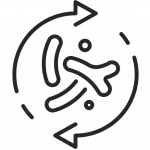Coffee in the morning and your heart health

Coffee is the most common cognitive enhancer – it wakes you up, energizes you and is a very important part of many people’s daily lives. Because coffee tends to make the heart beat faster, people often worry that drinking it can cause or worsen certain heart problems. Although coffee mostly raises blood pressure, this effect is usually short-lived and wears off over time. In addition, the latest research shows that a reasonable amount of coffee does not harm the heart and does not affect cholesterol levels, but directly helps to maintain heart health.
The results of several serious, ambitious studies conducted by American and British scientists, presented at the annual scientific session of the American College of Cardiology , show that drinking coffee, especially two to three cups a day, not only reduces heart disease and risk of dangerous heart rhythms, but may even improve cardiovascular health and prolong life. It is also a myth that coffee can raise cholesterol levels . These findings apply to both people with and without cardiovascular disease.
The studies used databases with health information on more than half a million people who were followed for at least 10 years. Researchers looked at different levels of coffee consumption, from one cup to six or more cups a day, and their association with heart rhythm problems (arrhythmias), cardiovascular disease, including coronary artery disease, heart failure and stroke. Patients were grouped according to the amount of coffee they drank each day. Overall, two to three cups of coffee a day showed the greatest benefit, meaning a 10-15% lower risk of coronary heart disease, heart failure, heart rhythm problems or death.

When caffeine is too much
So research shows that regular coffee consumption is safe and could be part of a healthy diet. You should not refrain from daily coffee consumption, on the contrary – it is even recommended to include it in the diet of people with and without heart disease, as long as it does not make you feel too restless. The only question is how much? It is understood that any excesses can be harmful to health. Where is the line between sensible and extra healthy coffee drinking and excessive caffeine consumption?
Caffeine is an alkaloid and the world’s most widely used stimulant, whose main mechanism of action is related to binding to adenosine receptors and blocking the action of adenosine, so it is also added to specific medications. Caffeine, as the active substance, was isolated from coffee beans by the German pharmacist and chemist Friedlieb Ferdinands Runge in 1819. He then also called this substance “kaffein”. Perhaps this is why people often equate coffee with caffeine, but remember that caffeine is found in quite a few food products, including tea, energy drinks, cola and chocolate.
Energy drinks get a bad rap because of their supposed high caffeine content, but in reality they usually only contain 80mg of caffeine per 250ml – less than a cup of coffee, which contains 100mg, and only slightly more than a cup of tea, which contains 75mg. But such a 250ml can of energy drink can contain almost seven teaspoons of sugar – the maximum amount you should consume throughout the day. Therefore, if you like energy drinks, it is recommended to choose sugar-free options as much as possible. On the other hand, the maximum dose of caffeine is about 400 mg per day, so – four cups of coffee, if you do not use other caffeine-containing products.

Benefits for heart health
It should be emphasized that there are more than 100 biologically active compounds in coffee beans. It’s these substances (not just caffeine) that can help reduce oxidative stress and inflammation, improve insulin sensitivity, speed up metabolism, inhibit fat absorption in the gut, and block receptors known to be associated with abnormal heart rhythms. Also, findings show that caffeinated coffee is better, and choosing decaffeinated coffee (which is especially popular in the US) has no cardiovascular benefits.
Perhaps more important is to think about how you drink your coffee. Unsweetened coffee and substituting whole milk for skim milk may improve heart health more than focusing on caffeine. However, many people do not drink coffee simply black, and such a taste can be harmful. Adding cream and sugar to coffee, when you continue to consume several cups each day, significantly increases the calories, sugar and saturated fat content in the body, which can lead to weight gain, high blood sugar and cholesterol ,diabetes, heart disease and other health problems. Sweets, muffins, cupcakes “with coffee” will also increase these risks.
Habits in everyday life affect health in both positive and negative ways. Drinking black, unsweetened coffee isn’t a heart-health miracle stick either. If you want to feel good, you should combine coffee consumption with an active lifestyle, appropriate physical activities and a balanced diet dominated by heart-healthy foods such as green leafy vegetables, whole grains, nuts, avocado, chicken or fish fillet. Follows weight, blood count, abandons harmful habits, uses valuable nutritional supplements. Well, you can also afford a piece of dark chocolate.
For normal cholesterol level – AteroLip® complex caps!
Sometimes healthy lifestyle changes are not enough to lower cholesterol. Your doctor may also recommend over-the-counter or cholesterol-lowering medications. Take them as directed while continuing to make healthy lifestyle changes, which can help keep your medication dose low.
The turmeric extract contained in the cholesterol control product AteroLip® complex caps helps to maintain a normal blood cholesterol level, the functioning of the cardiovascular system, as well as to normalize liver lipids. Choline helps ensure normal lipid and homocysteine metabolism. Vitamin B12 contributes to the normal formation of red blood cells and helps ensure normal homocysteine metabolism. Niacin and vitamin B12 help ensure normal energy-yielding metabolism.
The complex of natural substances AteroLip® complex caps cares for the heart and helps maintain blood vessels in good condition thanks to the fact that it also contains the natural statin monacolin K, obtained from red yeast rice, policosanol obtained from sugar cane, as well as standardized olive (Olea europea) leaf dry extract (polyphenol hydroxytyrosol).
AteroLip® complex caps are easy to use – only one capsule a day! The product is available in 30 capsules and the advantageous 90 capsules package. The best offer on the Lotos Pharma website www.lotos-pharma.ee.










